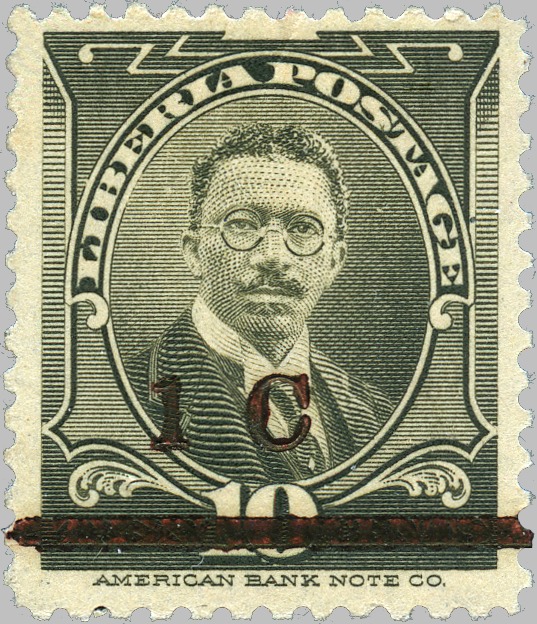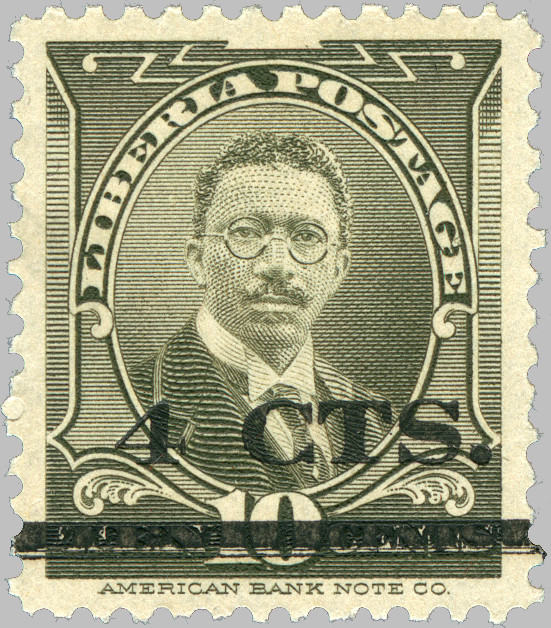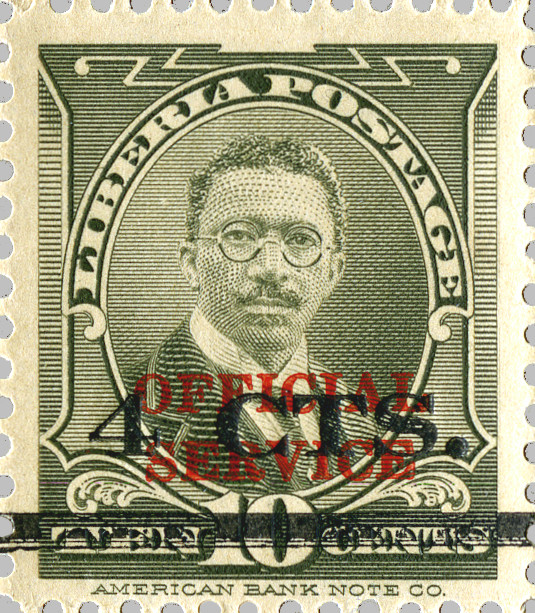Issue of 1928 Surcharged 1944–45
Of the various issues overprinted during WW2 the ABNCo issue of 1928 was by far the oldest when surcharging started in 1944.
After having been exposed to the Liberian climate for more than 15 years many of the sheets were stuck to the interleavings, und probably proved to be too cumbersome for the postal employees to use;
which is most likely the reason why a relatively large number of them remained intact until today.

“1ct.” on 2 cents violet (Scott #288A)

“1 C” on 10 cents olive gray (Scott #289A)
| • | overprinted in red brown on setting of 50 (10 x 5) |
| • | bars obliterating old value “TEN10CENTS” set as single contiguous line across sheet |
| setting varieties: |
|---|
| • | none | |
| printing varieties: |
|---|
| • | surcharge double (Scott #289Ab) – one in red brown and one in dark violet with normal figure “1” but small sized “c”;
the violet surcharge is generally just to left of normal and seems to slope slightly to the right always; believed only one sheet of 50 was printed |
| • | additional blue obliterator line on stamps with misplaced original red brown obliterator bar |

“2 CTS.” on 5 cents ultra (Scott #290A)
| • | overprinted in black on setting of 50 (10 x 5) |
| • | bar obliterating old value “5 FIVE CENTS 5” is continuous across the sheet and appears as two bars very close together on some stamps |
| setting varieties: |
|---|
| • | pos 6: | small raised stop |
| • | pos 40: | large stop |
| • | pos 47–50: | small “2” |
| printing varieties: |
|---|
| • | “2 CTS.” double |
| • | bar double |

“2 Cts.” on 5 cents ultra (Scott #290B)
| • | overprinted in blue on setting of 50 (10 x 5) |
| • | bar obliterating old value “5 FIVE CENTS 5” is continuous across the sheet and usually made up of two parallel lines very close together but also with wide space between them or second line missing altogether |
| setting varieties: |
|---|
| • | pos ? (probably last column): “C.ts” instead of “Cts.” |
| printing varieties: |
|---|
| • | inverted overprint |
| • | inverted surcharge but bar normal |
| • | inverted surcharge double bars (top and bottom) |

“3¢” on 2 cents violet (Scott #291)
| • | handstamped in deep purple |
| • | short vertical obliterator lines through “2” and smudged thick obliterator bar through “TWO CENTS” in same ink or black |
| printing varieties: |
|---|
| • | as with all handstamps, the impression can vary considerably from thin to very thick |


“4 CTS.” on 10c olive gray regular (Scott #292A) and official (Scott O165)
| • | overprinted in black on setting of 50 (10 x 5); surcharge on official probably accidental due to some sheets mixed in with pile of regular issue sheets; both regular and official sheets with two settings: first setting with “CTl.” variety at pos. 24, second (corrected) setting without |
| • | bars obliterating old value “TEN10CENTS” set as single contiguous line across sheet |
| setting varieties: |
|---|
| • | pos 20: | large full stop |
| • | pos 24: | “CTl.” for “CTS.”, later corrected in a second setting (see official sheet); Cockrill calls this variety “CT1.”, but the type replacing the “S” is really the same seriffed lower case “l” as in the “dropped l” variety of 288A |
| • | pos 31, 33, 42, 43, 44: | small “4” |
| • | pos 41: | thin upright “4” |
| • | pos 45: | spaced full stop; this piece of type gradually loosened on pos. 45 until it appeared on the next stamp at pos. 46 |
| • | pos 46: | small raised stop |
| printing varieties (regular issue only): |
|---|
| • | double overprint |
| • | double overprint, one inverted; probably one sheet only |
regular issue, first setting
official issue, second setting








